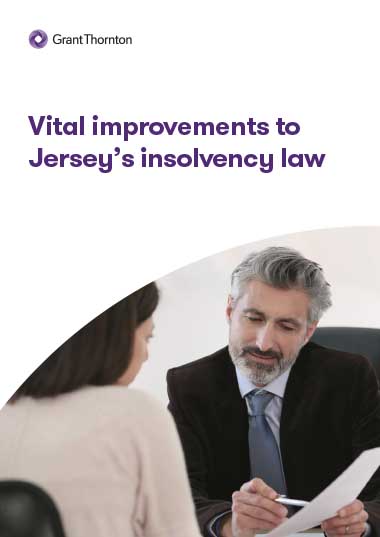-
Sector Focus
We specialise in the investment management industry offering audit, assurance, tax and corporate recovery and liquidation services.
-
Personal Tax Services
There are many tax rules that can affect you personally and therefore which will have an impact on your personal wealth.
-
QI Compliance
Qualified Intermediaries (QI) have to take action now to perform a Certification to the Internal Revenue Service (IRS).
-
Download our tax brochures
The tax teams at Grant Thornton aim to provide the Channel Islands with a premier tax advisory service both to private clients and the business community including the investment management industry.
-
Jersey Tax Return
A secure sign in page to file Jersey Tax Returns through the Grant Thornton tax portal.
-
ESG
ESG can either be seen as a risk management tool or an opportunity, either way it is imperative to your business, whatever your size and whether you are listed or not.
-
Professional Services
Business and accounting support for professional services
-
Finance Industry
We work with a broad range of clients and their financial stakeholders, from entrepreneurs in the early days to fast growing and established businesses to public companies competing in global markets.
-
Local Businesses
Businesses come in many shapes and sizes – from innovative start-ups to long-established local businesses. But however large or small your business, the chances are you face similar challenges.
-
Corporate Insolvency
Our corporate investigation, Guernsey liquidation and recovery teams focus on identifying and resolving issues affecting profitability, protecting enterprise value and facilitating a full recovery where possible.
-
Corporate Simplification
Redundant corporate entities can over complicate group structures and waste thousands of pounds in unnecessary costs each year. 46% of the c.15,500 companies controlled by the FTSE100 are dormant and it is estimated that the average cost of administering dormant companies is between £3,500 and £5,000 per company, per year.
-
Debt Advisory
Our Debt Advisory team provides commercial and financial debt advice to corporate entities and public sector bodies in a range of sectors. Our engagements include advice on stand-alone transactions and solutions or as part of an integrated business plan, in both the project and corporate arenas.
-
Exit Strategy Services
We offer a tailored methodology designed to enable a company to be reviewed in a group context to assess ways to maximise its value.
-
Financial Restructuring
For companies challenged by under-performance we work with management teams, shareholders, lenders and other stakeholders to implement financial restructuring solutions creating a stable platform for business turnaround.
-
Strategic performance reviews
Strategic performance reviews analyse the key drivers of performance improvement. Our specialists utilise a framework to evaluate financial and operational options and to identify solutions for businesses and their stakeholders.
Jersey’s insolvency regime has remained largely unchanged for a number of years.
Workable in its present form thanks to the flexible and pragmatic approach of the Royal Court, Jersey will now introduce three important changes towards a modern insolvency regime.
- Creditors' Winding Up
- Provisional Liquidation
- Registration of Approved Liquidators
These will provide greater protections for creditor interests and assist with debt recovery actions in Jersey.
The Government of Jersey approved these changes in the Companies (Amendment No.8) Regulations 2022 (“the Regulations”) on 8 February 2022. The regulations are expected to come into effect on, or shortly after, 1 March 2022.
Creditors' Winding Up
The new creditors' winding up process permits a creditor to apply to the Royal Court for an insolvent company to be placed into liquidation and a liquidator to be appointed.
To be able to make an application, the creditor must be owed a debt greater than £3,000 and the:
- debtor company must be unable to pay its debts; or
- creditor has evidence of the company’s insolvency; or
- debtor company consents to the application.
The Regulations introduce a Statutory Demand process whereby the debtor company is deemed to be unable to pay its debts as they fall due if:
- the creditor has served a statutory demand on the debtor company requiring payment of the debt due; and
- within 21 days, the debtor company has failed to pay the debt due or adequately dispute the debt due to the satisfaction of the creditor.
The Statutory Demand document is in a prescribed form and available from the Viscount via its website at https://www.gov.je/Government/NonexecLegal/Viscount
While the Companies (Jersey) Law 1991 already includes a creditors' winding up process, perhaps somewhat misleadingly, this must be voluntarily commenced by the shareholders of the debtor company passing the requisite special resolution, rather than the creditors'. Therefore it does not permit a creditor to have adequate recourse in the event of being unpaid by a Jersey company.
Until the Regulations, creditors' were only able to commence an insolvency process against a debtor company under the Bankruptcy (Desastre)(Jersey) Law 1990, however, this has cost and procedural hurdles that make it a less attractive route for creditors' to follow than the new creditor winding up process.
Provisional Liquidator
A creditor will now be able to apply to the Royal Court for a creditors' winding up prefaced by the appointment of a Provisional Liquidator.
The ability to appoint a Provisional Liquidator is an important tool where there is a concern that the company’s affairs will not be managed properly between the application date and winding up hearing date, and/or there is a risk of assets being dissipated.
The Provisional Liquidator’s powers will be determined by the Court, but the primary role is to preserve the assets of the debtor company, as well as the books and records which will be critical to any investigation.
Registration of Approved Liquidators
In addition to the Regulations, the Companies (General Provisions)(Amendment No.6) (Jersey) Order 2022 (“the Order”) will come into effect.
A Register of Approved Liquidators will be created, which will be administered by the Viscount. To be eligible, an ‘Approved Liquidator’ will not only need to meet the qualification requirements but will need to be Jersey resident and have a substantial insurance bond in place. It will still be possible for a non-Jersey resident who meets the remaining eligibility criteria to be appointed, but they must be appointed jointly with an Approved Liquidator.
The Order will also amend the professional qualifications required of a liquidator of a Jersey public company and those in creditors' winding up (either court or voluntary process), widening the categories of professionals to include a UK licenced Insolvency Practitioner. Currently the requirement for a Jersey liquidator is to be a member of a prescribed professional accountancy body. Additional experience requirements will also be imposed.
Conclusion
These substantial improvements to the Jersey insolvency regime will both bring Jersey insolvency legislation into line with other leading financial centres, and also provide creditors' with a greater level of protection and an additional mechanism with which to pursue debt recovery.
For the present, modern restructuring procedures of Administration and Company Voluntary Arrangements remain unavailable in Jersey.

